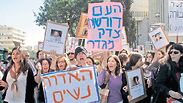

Fighting gender segregation in the Jewish state
OPINION: Elinor Davidov, who leads the campaign against the separation of women and men at the Israel Women's Network, has been fighting against the exclusion of women in public areas for the past two years; now she is calling on the public to join her in the struggle against this troubling phenomenon, which is still prevalent in Israel in 2019.
Imagine that on your way to work tomorrow morning you are asked to bid farewell to the woman next to you because she has to walk on the other side of the street for the sake of modesty. Imagine that all the advertising in your neighborhood that featured women has been completely vandalized. Imagine that women are not allowed to appear on stage in the upcoming Independence Day celebrations, and besides you have to sit apart from your family because men and women are not allowed to sit together anymore.
Imagine that you are called to attend a defensive driving course, from which women are banned. Imagine finding out that entertainment shows for the whole family, which are subsidized by the municipality or by government offices, are strictly for men.
And what if a mother wants to go with her son to the library or send him there with his sister to borrow a book? Sorry, no can do, because the library is funded by the municipality, and that means boys and girls can only visit the establishment at different hours.
Unfortunately, for a long while now, such scenarios have not merely been part of our imaginations, or stem from baseless fear. Over the two past years, many girls and women who have experienced discrimination and gender segregation have reached out to me. They call me after a sign, a security guard, or just a man walking down the road has prevented them from entering a certain street, sitting at the front of a bus or visiting the public library simply because they are females.
These discriminatory and derogatory incidents—which are forbidden by law in Israel—have happened in reality, and are becoming an integral part of the lives of women in the Jewish state.
The hotline set up by Israel Women's Network has recently received dozens of calls from both women and men, reporting gender segregation in public domains as well as complete exclusion of women from courses and cultural events funded by taxpayers' money. What usually comes across as a legitimate behavior of the ultra-Orthodox community in public spaces, has transformed into routine in every city, town and community across the country. But this is not legitimate conduct, not at all.
Radicalization in matters of modesty and gender segregation is a fairly new process that the various religious communities in Israel are undergoing. Ultra-Orthodox women tell me that while they were growing up, female figures did appear in children's books. The extreme gender segregation we are witnessing today did not exist back then—not in the homes of the members of the ultra-Orthodox community and not in the public areas. This dangerous radicalization, which violates women's right to free movement in the public sphere, has been met by a toxic cocktail of indifference and institutional chauvinism, allowing gender segregation to infiltrate into local authorities, higher education establishments, the public transportation network, hotels and every other aspect of our lives.
It is worth mentioning that in 2000, the government passed a law prohibiting discrimination in products, services and entry to entertainment and public places. Only women have the right to decide what to do with their bodies, at any time and in any place. We can dress however we want, go and sit wherever we want without being afraid of violent or discriminatory ramifications.
We all know there is no such thing "segregated but equal." When men and women are separated, women are the ones who are sent to the back of the bus, given the worst seats at a concert, and made to attend classes at the most inconvenient times.
But putting the law, morality, justice, history and human rights aside, we must remember one thing: when women are pushed back or aside, they conclude that there is something wrong with them. They start believing their body is merely an instrument of sex, meant to seduce. We are led to believe that we must hide, disappear, be silent — because the exclusion of women, like sexual harassment, reduces the essence of a woman to merely her body.
A long line of organizations, activists and opinion leaders have joined the fight against segregation of women, and we do not intend to give up.
I invite each and every one of you who have seen a sign calling for modesty or telling women where they can and can't sit, who has been asked to walk down separate streets to men, or those who noticed that a certain class, course, or show are closed to women, to reach out to us so we can halt this grave moral deterioration and emerge victorious in the fight for the status of women in Israeli society.


















